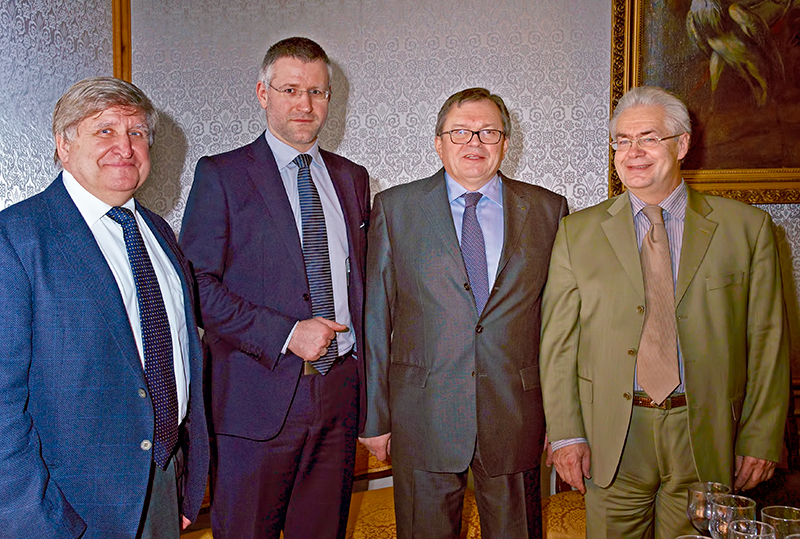RFFI Annual Reception 2012

Eliseev (director of RFFI), Achterberg (DFG Moscow), Panchenko (chair of RFFI), Sharov (Head of International Affairs, RFFI)
(17.12.12) On 14 December 2012, the Russian Foundation for Basic Research (RFFI) held its third Christmas reception for international partner organisations and the diplomatic corps. The chairman of the council of the RFFI, Vladislav Panchenko, addressed the invited guests at Central Research House , speaking about the organisation's activities and paying tribute to the commitment of the German Research Foundation (DFG) to the international collaboration.
"In the twentieth year of its existence, both the RFFI and its importance as a sponsor of basic research in Russia are continually growing," said Mr. Panchenko. As a reflection of this, in 2013 the organisation's budget is set to increase from 6 billion to 8 billion roubles (around €200 million). Mr. Panchenko noted that there has been particular success in early career support, as demonstrated by the two German-Russian Research Training Groups funded jointly with the DFG. He stressed the key role played by Germany and the DFG in particular in the expansion of the RFFI's international activities. This year both the RFFI and the DFG again took part in the multilateral call for bids organised by the major research funding organisations in the G8 countries (G8 HORCs), focusing on the issue of Freshwater Security and Coastal Vulnerability.
Then it was the turn of Dr. Jörn Achterberg, director of the DFG's Moscow office, who highlighted some other key successes of the past year. First there was the DFG's traditional summer reception in Moscow, opened by the heads of the DFG and the RFFI together with the German ambassador. Professor Kleiner and Professor Panchenko, as well as the envoy of the German Embassy, Dr. Georg Birgelen, also formally opened the series of lectures given by recipients of the Leibniz Prize in Russia. In addition, the two partner organisations expanded their funding agreement to enlarge research collaboration in the DFG's coordinated programmes, such as International Research Training Groups and Collaborative Research Centres. A workshop will be held next February to present the structure of Collaborative Research Centres and clusters of excellence in Russia and the funding options available to them.
The Russian Foundation for Basic Research was founded in 1992 in line with the principles of academic self-governance, in order to award research grants to Russian researchers on a competitive proposal basis. In 1995, the DFG became the first European research organisation to sign a bilateral agreement with the RFFI to fund joint research projects. Since then, thousands of researchers have benefited from joint funding through several hundred projects and events. In addition to 150 full-time employees, about 300 researchers serve on the various committees of the RFFI. Each year, more than 3500 Russian researchers and over 1400 international researchers participate in the review process, writing some 65 000 reviews. Together with their German colleagues, Russian researchers can submit proposals in the following fields of basic research:
-
Mathematics, mechanics and information sciences
-
Physics and astronomy • Chemistry and materials sciences
-
Biology and medical sciences
-
Geosciences
-
Humanities and social sciences
-
Information and communication technology and computing systems
-
Engineering sciences